-
Title
-
Slave Songs of the United States
-
This edition
-
"Slave Songs of the United States" . Comp. William Francis Allen, Charles Pickard Ware, and Lucy McKim Garrison. New York: A. Simpson, 1867. xliv+115 pp.
-
Other editions, reprints, and translations
-
• "Slave Songs of the United States". Ed. William Francis Allen, Charles Pickard Ware, and Lucy McKim Garrison. New York: J. Ross, 1871. xliv+115 pp.
• "Slave Songs of the United States". Ed. William Francis Allen, Charles Pickard Ware, and Lucy McKim Garrison. New York: P. Smith, 1929, 1951. xliv+115 pp.
• "Slave Songs of the United States." Comp. William Francis Allen, Charles Pickward Ware, and Lucy McKim Garrison. With piano accompaniments and guitar chords by Irving Schlein. New York: Oak Publications, 1965. Repr. Milwaukee: Hal Leonard, 2005.
• "Slave Songs of the United States". Ed. William Francis Allen, Charles Pickard Ware, and Lucy McKim Garrison. Freeport, NY: Books for Libraries, 1971. xliv+115 pp.
• "Slave Songs of the United States". Ed. William Francis Allen, Charles Pickard Ware, and Lucy McKim Garrison. Intro. W. K. McNeil. Baltimore: Clearfield, 1992. 115 pp. [preview in Google Books https://books.google.com/books?id=6frfZd0-1xkC&lpg=PP1&dq=les%20cenelles&pg=PP1#v=onepage&q&f=false ]
• "Slave Songs of the United States". Ed. William Francis Allen, Charles Pickard Ware, and Lucy McKim Garrison. New York: Dover, 1995. xliv+115 pp.
• "Slave Songs of the United States". Ed. William Francis Allen, Charles Pickward Ware, and Lucy McKim Garrison. Chapel Hill: U of North Carolina at Chapel Hill Library, 2011. 224 pp. [Documenting the South ebook]
-
Translation (into Italian):
• "Slave Songs of the United States". Trans. Roberto Leopardi. Preface Luca Cerchiari. Palermo: L'EPOS, 2004. (See "BluesReviews" website http://www.bluesreviews.it/slave-songs-of-the-united-states/ )
-
Online access
-
• 1867 edition available via Google Books:
-
Google Books
-
• 1965 edition, with piano accompaniments and guitar chords by Irving Schlein, available via Google Books:
-
Google Books
-
• 1951 Peter Smith edition available via Internet Archive:
-
Internet Archive
-
• Electronic edition (transcription, with images of musical notations) available via "Documenting the South" (U of North Carolina):
-
Documenting the South
-
Table of contents
-
(1867 edition):
Introduction (i-xxxviii)
Table of Contents (xxxix-xlii [mislabelled "xliii"])
Directions for singing (xliii-xliv)
Part I. South-Eastern slave states, including South Carolina, Georgia and the Sea islands.
Part II. Northern seaboard slave states, including Delaware, Maryland, Virginia, and North Carolina
Part III. Inland slave states, including Tennessee, Arkansas, and the Mississippi river.
Part IV. Gulf states, including Florida and Louisiana: miscellaneous.
[The songs are presented here in alphabetical order, rather than in the original regional groupings indicated above, in order to make the contents easier to compare with other collections. I include, however, the item number and page references for each song]:
• Almost over [No. 97; p. 74]
• Archangel, open the door [No. 44; p. 32]
• Aurore Bradaire [No. 132; p. 110]
• Away down in Sunbury [No. 121; p. 99]
• Bell da ring [No. 46; pp. 33-34]
• Belle Layotte [No. 130; p. 109]
• Blow your trumpet, Gabriel [No. 4; p. 3]
• Bound to go [No. 30; p. 22]
• Brother, guide me home [No. 107; p. 86]
• Brother Moses gone [No. 65; p. 49]
• Build a house in paradise [No. 40; p. 29]
• Calinda [No. 133; p. 111]
• Caroline [No. 134; p. 111]
• Charleston gals [No. 109; p. 88]
• Children do linger [No. 69; p. 51]
• Come along, Moses [No. 126; p. 104]
• Come go with me [No. 77; pp. 57-58]
• The day of judgment [No. 72; p. 53]
• Don't be weary, traveller [No. 98; p. 75]
• Early in the morning [No. 58; p. 44]
• Every hour in the day [No. 78; p. 58]
• Fare ye well [No. 63; pp. 47-48]
• Give up the world [No. 37; pp. 27-28]
• God got plenty o' room [No. 128; p. 106]
• Go in the wilderness [No. 19; p. 14]
• The gold band [No. 103; p. 83]
• The golden altar [No. 100; p. 77]
• Good-bye [No. 70; p. 52]
• Good-bye, brother [No. 62; p. 47]
• Good news, member [No. 119; pp. 97-98]
• The good old way [No. 104; p. 84]
• The graveyard [No. 21; pp. 15-16]
• Gwine follow [No. 25; p. 18]
• Hail, Mary [No. 59; p. 45]
• Hallelu, hallelu [No. 68; p. 50]
• Happy morning [No. 13; p. 10]
• Heave away [No. 82; p. 61]
• Heaven bell a-ring [No. 27; p. 20]
• The heaven bells [No. 102; p. 79]
• Hold out to the end [No. 76; p. 57]
• Hold your light [No. 12; p. 10]
• Hunting for a city [No. 24; p. 18]
• Hunting for the Lord [No. 18; p. 13]
• The hypocrite and the concubine [No. 91; p. 70]
• I an' Satan had a race [No. 51; p. 40]
• I can't stand the fire [No. 55; p. 42]
• I can't stay behind [No. 8; p. 6]
• I don't feel weary [No. 90; p. 70]
• I hear from heaven to-day [No. 3; p. 2]
• I know when I'm going home [No. 41; p. 30]
• I'm a-trouble in de mind [No. 42; pp. 30-31]
• I'm going home [No. 105; p. 84]
• I'm gwine to Alabamy [No. 111; p. 89]
• I'm in trouble [No. 113; p. 94]
• In the mansions above [No. 79; p. 59]
• I saw the beam in my sister's eye [No. 23; pp. 17-18]
• I want to die like-a Lazarus die [No. 120; p. 98]
• I want to go home [No. 61; p. 46]
• I want to join the band [No. 116; p. 95]
• I wish I been dere [No. 39; p. 29]
• Jacob's ladder [No. 117; p. 96]
• Jehovah, hallelujah [No. 2; p. 2]
• Jesus on the waterside [No. 38; pp. 28-29]
• Jesus, won't you come by-and-by [No. 81; p. 60]
• Jine 'em [No. 28; p. 21]
• John, John, of the holy order [No. 22; pp. 16-17]
• Join the angel band [No. 50; p. 39]
• Jordan's mills [No. 88; p. 68]
• Just now [No. 85; p. 67]
• King Emanuel [No. 35; p. 26]
• Lay this body down [No. 26; pp. 19-20]
• Lean on the Lord's side [No. 123; p. 100]
• Let God's saints come in [No. 99; p. 76]
• Little children, then won't you be glad [No. 108; p. 87]
• Lolotte [No. 135; p. 112]
• The lonesome valley [No. 7; p. 5]
• Lord, make me more patient [No. 71; p. 52]
• Lord, remember me [No. 15; p. 12]
• Many thousand go [No. 64; p. 48]
• There's a meeting here to-night [No. 11; p. 9]
• Meet, o Lord [No. 56; p. 43]
• Michael row the boat ashore [No. 31; pp. 23-24]
• My army cross over [No. 49; p. 38]
• My body rock 'long fever [No. 45; pp. 32-33]
• My father, how long [No. 112; p. 93]
• Musieu Bainjo [No. 136; p. 113]
• Nobody knows the trouble I've had [No. 74; p.55]
• No man can hinder me [No. 14; pp. 10-11]
• No more rain fall for wet you [No. 60; p. 46]
• Not weary yet [No. 16; p. 12]
• O brothers, don't get weary [No. 115; p. 95]
• O Daniel [No. 114; p. 94]
• O'er the crossing [No. 93; p. 72]
• The old ship of Zion [two versions] [No. 125; pp. 102-03]
• On to glory [No. 84; p. 66]
• O shout away [No. 92; p. 71]
• Poor Rosy [No. 9; p. 7]
• Praise, member [No. 5; p. 4]
• Pray all de member [No. 47; p. 35]
• Pray on [No. 118; p. 97]
• Rain fall and wet Becca Lawton [No. 29; pp. 21-22]
• Religion so sweet [No. 17; p. 13]
• Rémon [No. 131; p. 110]
• The resurrection morn [No. 73; p. 54]
• Rock o' jubilee [No. 33; p. 25]
• Rock o' my soul [No. 94; p. 73]
• Roll, Jordan, roll [No. 1; p. 1]
• Round the corn, Sally [No. 87; p. 68]
• Run, nigger, run [No. 110; p. 89]
• Sabbath has no end [No. 89; p. 69]
• Sail, o believer [No. 32; p. 24]
• Satan's camp afire [No. 36; p. 27]
• Shall I die [No. 52; p. 41]
• Shock along, John [No. 86; p. 67]
• Shout on, children [No. 80; p. 60]
• Sinner won't die no more [No. 106; p. 85]
• The sin-sick soul [No. 66; p. 49]
• The social band [No. 127; p. 105]
• Some valiant soldier [No. 67; p. 50]
• Stars begin to fall [No. 34; pp. 25-26]
• Tell my Jesus "Morning" [No. 20; p. 15]
• These are all my father's children [No. 124; p. 101]
• Travel on [No. 43; p. 31]
• The trouble of the world [No. 10; p. 8]
• This is the trouble of the world [No. 122; pp. 99-100]
• Turn, sinner, turn O [No. 48; pp. 36-37]
• Wait, Mr. Mackright [No. 57; p. 43]
• Wake up, Jacob [No. 83; p. 65]
• We will march through the valley [No. 95; p. 73]
• What a trying time [No. 96; p. 74]
• When we do meet again [No. 53; p. 41]
• The white marble stone [No. 54; p. 42]
• Who is on the Lord's side [No. 75; p. 56]
• The winter [No. 101; p. 78]
• Wrestle on, Jacob [No. 6; pp. 4-5]
• You must be pure and holy [No. 129; pp. 107-08]
Editors' note (114-15)
Index to the Songs [by title] [117]
-
(1951 ed.—songs listed alphabetically, rather than arranged by region): [same as list given for 1867 edition, except missing "Turn, sinner, turn"]
-
(Hal Leonard edition, with piano accompaniments by Irving Schlein (1965), repr. J.W. Pepper (2005): alphabetical listing of all songs, incl. "Turn, sinner, turn.")
-
JW Pepper
-
About the anthology
-
• Includes words and music for 136 songs, plus some variants: Most of these are sacred songs (spirituals), while a few are work songs and also included are seven secular creole songs from Louisiana. Otherwise, the songs hail from Delaware, Virginia, Maryland, North Carolina, South Carolina, Georgia, Tennessee, Arkansas, and Florida.
-
Reviews and notices of anthology
-
• "Literature of the Day." Rev. of "Slave Songs of the United States." "Lippincott's Magazine" 1 (March 1868): 341-43. Available online at HathiTrust:
-
HathiTrust
-
The unnamed reviewer, who openly avows his racist beliefs, spends most of the review extolling what he sees as the musical genius of the white race and the utter barbarity and lack of musical genius of the black race. Unsurprisingly, when he does turn to comment on the anthology itself in his final two paragraphs, he is utterly dismissive of it, concluding his "review" with the statement: "It was hardly worth while to try to perpetuate this trash, vulgarity and profanity by putting it in print" (343).
-
Commentary on anthology
-
• "First published in 1867, Slave Songs of the United States represents the work of its three editors, all of whom collected and annotated these songs while working in the Sea Islands of South Carolina during the Civil War, and also of other collectors who transcribed songs sung by former slaves in other parts of the country. The transcriptions are preceded by an introduction written by William Francis Allen, the chief editor of the collection, who provides his own explanation of the origin of the songs and the circumstances under which they were sung. One critic has noted that, like the editors' introductions to slave narratives, Allen's introduction seeks to lend to slave expressions the honor of white authority and approval. Gathered during and after the Civil War, the songs, most of which are religious, reflect the time of slavery, and their collectors worried that they were beginning to disappear. Allen declares the editors' purpose to be to preserve, "while it is still possible ... these relics of a state of society which has passed away"" (WorldCat; record for 2011 U of North Carolina ed.).
-
See also
-
• Garrison, Lucy McKim. “Songs of the Port Royal ‘Contrabands.’” "Dwight’s Journal of Music" 21 (8 Nov. 1862): 254-55.
• Charters, Samuel. "Songs of Sorrow: Lucy McKim Garrison and Slave Songs of the United States". Jackson: UP of Mississippi, 2015. xiv+304 pp.
"In the spring of 1862, Lucy McKim, the nineteen-year-old daughter of a Philadelphia abolitionist Quaker family, traveled with her father to the Sea Islands of South Carolina to aid him in his efforts to organize humanitarian aid for thousands of newly freed slaves. During her stay she heard the singing of the slaves in their churches, as they rowed their boats from island to island, and as they worked and played. Already a skilled musician, she determined to preserve as much of the music as she could, quickly writing down words and melodies, some of them only fleeting improvisations. Upon her return to Philadelphia, she began composing musical settings for the songs and in the fall of 1862 published the first serious musical arrangements of slave songs. She also wrote about the musical characteristics of slave songs, and published, in a leading musical journal of the time, the first article to discuss what she had witnessed. In "Songs of Sorrow" renowned music scholar Samuel Charters tells McKim's personal story. Letters reveal the story of young women's lives during the harsh years of the war. At the same time that her arrangements of the songs were being published, a man with whom she had an unofficial "attachment" was killed in battle, and the war forced her to temporarily abandon her work. In 1865 she married Wendell Phillips Garrison, son of abolitionist William Lloyd Garrison, and in the early months of their marriage she proposed that they turn to the collection of slave songs that had long been her dream. She and her husband--a founder and literary editor of the recently launched journal The Nation--enlisted the help of two associates who had also collected songs in the Sea Islands. Their book, Slave Songs of the United States, appeared in 1867. After a long illness, ultimately ending in paralysis, she died at the age of thirty-four in 1877. This book reclaims the story of a pioneer in ethnomusicology, one whose influential work affected the Fisk Jubilee Singers and many others" (publisher's description; WorldCat).
-
Cited in
-
• "A Select Bibliography of the American Negro". Comp. W. E. B. DuBois. Atlanta: Atlanta UP, 1905. Web http://scua.library.umass.edu/digital/dubois/dubois10.pdf . 11.
• Kinnamon 1997: 480. [cites original ed.]
-
Item Number
-
A0003
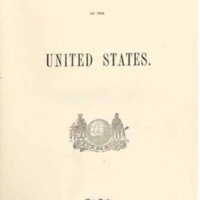 Title page (1867 ed.)
Title page (1867 ed.)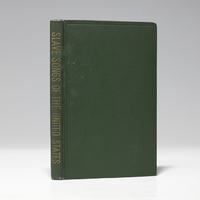 Front cover and spine (Peter Smith ed. 1929)
Front cover and spine (Peter Smith ed. 1929)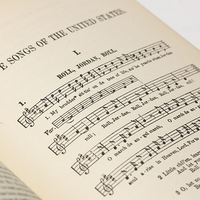 Sample page image (Peter Smith ed. 1929)
Sample page image (Peter Smith ed. 1929)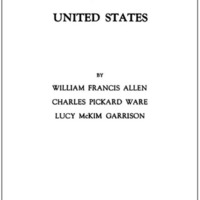 Title page (Peter Smith ed. 1951)
Title page (Peter Smith ed. 1951)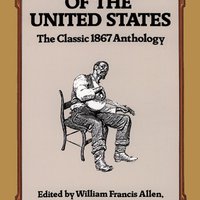 Front cover (Dover ed. 1995)
Front cover (Dover ed. 1995)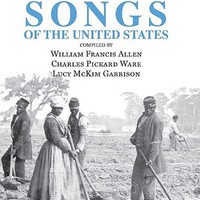 Front cover (Applewood ed. 1996)
Front cover (Applewood ed. 1996)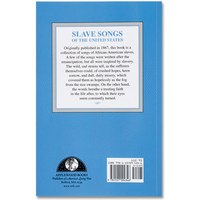 Back cover (Applewood ed. 1996)
Back cover (Applewood ed. 1996)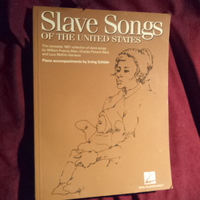 Front cover (Hal Leonard ed. 2005)
Front cover (Hal Leonard ed. 2005)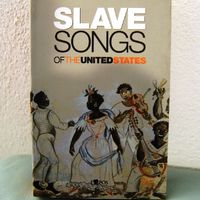 Front cover Italian trans. (L'Epos ed. 2004)
Front cover Italian trans. (L'Epos ed. 2004)







